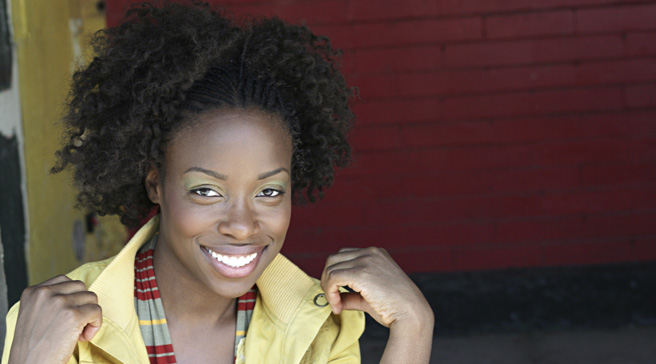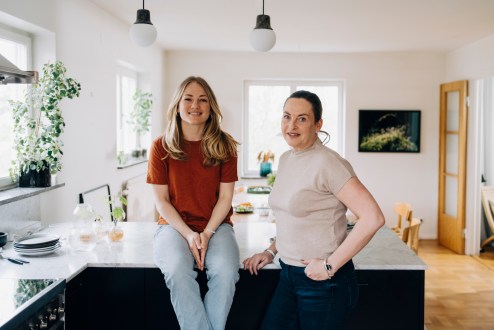The beauty of black hair
Exploring the beauty, meaning and metaphor of black hair, Justine Knight ditches the straighteners and begins her journey back to natural

While most eight-year-old girls begin their pre-birthday grooming rituals with beribboned hair and glitter-varnished nails, my celebrations began with the ‘gift’ of straightened strands. Using a metal comb heated on our gas cooker, my tiny afro was scorched into submission by a family friend.
As each searing stroke unkinked my candyfloss curls, I squeezed my eyes shut, distracting myself with happy thoughts of swinging ponytails, silky locks that brushes would glide through and a cameo role on The Cosby Show. This coming-of-age ritual marked the beginning of a relentless mission to achieve ‘good’ hair. Hair like my mother’s inky strands, which required just a dollop of serum and a blow-dry to achieve a ‘swish’ straight out of a TV commercial.
Mine was, by definition, ‘bad’ hair. Growing up, classmates likened my plaits to scary snakes, teenage boys pulled at the short lengths and muttered ‘nappy’, while my grandmother unapologetically described natural as ‘ugly’. It was just such an experience that upset comic Chris Rock’s five-year-old daughter, who is said to have asked her father why she didn’t have ‘good’ hair. Rock was inspired to make Good Hair, a documentary that takes a sideways look at the mysteries and taboos surrounding black hair culture – from the women who would rather default on their rent than forgo a salon appointment, to the ‘don’t touch’ etiquette of sexual intercourse avec weave.
While Rock’s film sparked debate, and brought the complex relationship between black women and their hair to the mainstream, many felt it failed to put the obsessive preoccupation presented into context. Lori Tharps, co-author of Hair Story: Untangling The Roots Of Black Hair In America, says a black woman’s worth has been linked to her hair for centuries. ‘During slavery, women with straighter hair were considered more aesthetically pleasing to their white masters, and so were more likely to become house-slaves, dramatically extending life expectancy beyond that of coarser-haired field labourers,’ she says. ‘Straight hair was “good” in a way that went beyond beauty. It was a matter of life and death.’
The styling methods forming the basis of today’s black hair industry were born out of oppression. Enterprising slaves turned to hot combs and corrosive lye mixtures made from potatoes and lard – crude precursors of relaxants. ‘Over centuries, grooming rituals that were once survival strategies were internalised by the descendants of slaves and have moulded distorted definitions of beauty and worth,’ says Tharps, who suggests that success has replaced survival in modern black women’s subconscious pursuit of straight hair.
So, is it this same desire to conform and succeed that keeps the multi-million-pound black-haircare industry afloat? Does wearing my hair straight expose a slave mentality, or simply make me a slave to fashion?
‘Hair is just hair,’ says Eve Owusu, senior stylist at Errol Douglas salon. ‘Nobody complains when white women wear extensions or have braids, so why are black women questioned about their racial identity when they’re simply exploring hair’s amazing versatility?’ And while I’ve explored my hair’s versatility to breaking point with curly perms, highlights and clip-on ponytails, it’s been seven years since I saw my natural hair.
But ready for change, and concerned about my fraying hairline, I’ve found myself wondering what it would be like to be liberated from a 20-year cycle of destructive chemicals and extensions. What would it feel like to be able to run my hands through my hair? How long could it grow if left to its own devices? Would I finally be able to enjoy swimming, Bikram yoga and sex in the shower without fretting over frizz? But while I continue to ponder returning my hair to its natural state, every empowering thought is accompanied by doubts. Will I still be attractive to the opposite sex? Will it affect my career if employers consider me different – or even radical?
‘Both black and white society are still unused to seeing black women with natural hair, so a move from straight to natural is often interpreted as a social or political statement, and provokes strong reactions by breaking away from the norm,’ says Kagem Tibaijuka, of natural-hair blog Charcoal Ink. Tibaijuka’s theory is one that chimes with the online response to Solange Knowles, singer and sister of Beyoncé, replacing her £30,000-a-year weave habit with a natural short crop. Her new ’do was Googled more than the Iran elections, and prompted divisive reactions – ranging from supportive to downright derisory.
Despite such negativity, the pro-natural-hair movement continues to gain momentum, as style icons such as Corinne Bailey Rae and Malia and Sasha Obama inspire young black women to embrace their natural beauty, with the help of curl-conscious brands such as Miss Jessie’s. But it’s online that I’ve found myself most inspired. I’ve unearthed the beautifully executed lecoil.tumblr.com (a photo blog showcasing gorgeous natural hairstyles), YouTube clips of Willow Smith’s empowering ‘Whip My Hair’ anthem and video tutorials demonstrating the lost art of washing afro hair.
‘The internet is the looking glass that has finally given black women the positive representation of natural hair that has historically been excluded from the mainstream media,’ says Tibaijuka. This new forum, agrees Tharps, will be pivotal in enabling black women to accept and celebrate the beauty of their natural hair. ‘It’s easy to criticise and ridicule black women for their hair obsession, but how can you expect somebody to love something they’ve never seen portrayed in a positive light, even in their own community?’
So, where am I with my own natural-hair journey? The date of the ‘big reveal’, as I’ve come to call it, has almost arrived. Am I nervous? Extremely. But I’m excited, too. It’s difficult to say if this transition back to my hair’s virgin state will be a permanent style choice, but the decision to commit exclusively to wearing my locks natural feels loaded with the familiar pressure to conform, and filled with the angst of making statements and setting agendas.
Finding my personal beauty ideal – one that gives me the freedom to express my ever-changing mood through my hair – has become my real quest. Up or down, straight or curly, natural or relaxed, I’ll continue to be inspired by the richness of my culture, but remain mindful of the fragile beauty of my natural curls – that’s my definition of ‘good hair’, and I hope I’ll get there by diverting some of the excessive attention I’ve given to what’s on my head to the tangled thoughts going on inside.








